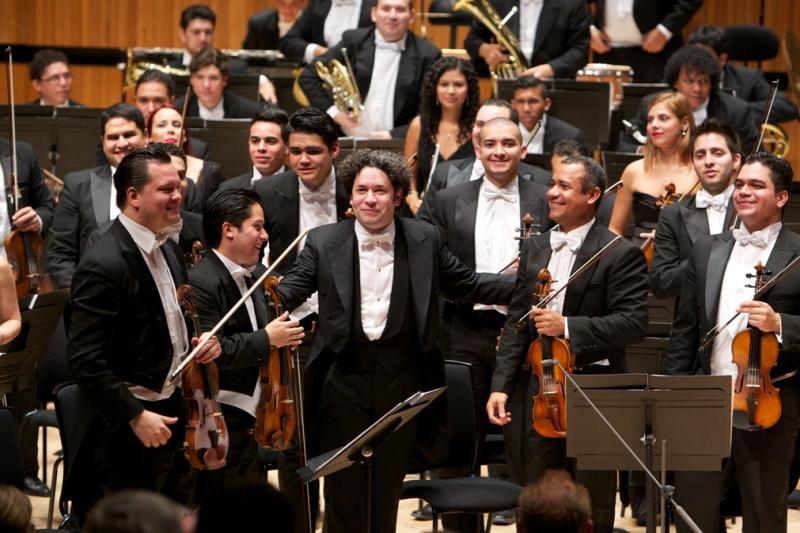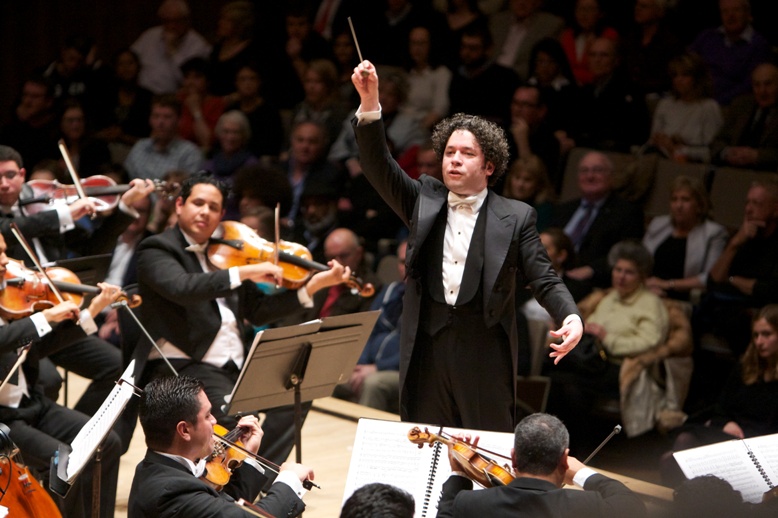Simón Bolívar Symphony Orchestra of Venezuela, Dudamel, RFH | reviews, news & interviews
Simón Bolívar Symphony Orchestra of Venezuela, Dudamel, RFH
Simón Bolívar Symphony Orchestra of Venezuela, Dudamel, RFH
Muscular Beethoven, but the second-half Wagner was wrong in so many ways

Youth may have vanished from the title, and its first flush is gone from the cheeks of most of the young persons. Now they’re in their prime, a magnificent sight – and the sound, too, is that of a world-class orchestra with a voice. Which we heard at its most distinctive, deep and muscular, from the strings in the opening signals of Beethoven’s Fifth Symphony. So what went wrong with the music from Wagner’s Ring in their first 2015 Southbank concert’s second half?
Ultimately the blame must rest with Gustavo Dudamel – when good, great, but horrid when he gets the wrong end of the stick, as I’ve heard him do in Mahler, and Wagner was a worse casualty last night. It didn’t help to be faced with an even emptier, brassy pageant so soon after the finale of the Beethoven (the louder and bigger the worse it gets, in my opinion). Wotan only knows whose “version” this was of the "Entry of the Gods into Valhalla" at the end of the first Ring opera, Das Rheingold. We got the warning Rhinemaidens minus the three voices floundering twice over at an agonizingly slow, unvocal speed, and missed the key event (Wotan’s big idea) before what Wagner intended as the deliberately empty pomp of the curtain. Hero Siegfried then loped off in search of new adventures and promptly died, was reborn under the tall forest trees and finally unborn as his aunts the Valkyries hoiotohoed in mid-air, not yet cognizant of his conception.
There are two ways to avoid the topsy-turviness: hire a soprano so that you can end where Wagner does, with Brünnhilde’s Immolation Scene, or turn to Henk de Vlieger’s hour-plus "orchestral adventure", an odyssey not that much longer than what we got which actually has time and scope to transport you somewhere (it certainly did that against the odds when Mark Wigglesworth conducted it at the Barbican). Transports might still have been possible here if Dudamel had made the orchestra soar rather than merely billow. As it was these edifices were built not on the flowing Rhine but over a swamp, into which they sank for whole swathes.
 Had Dudamel (pictured right conductng last night) told the young players the stories? You couldn’t really picture anything until the lovely woodwind birdsong of Siegfried’s Forest Murmurs – dreamy beauty here from first flautist Katherine Rivas, oboist Frank Giraldo and clarinettist David Medina – and the irrepressible swagger of the Ride of the Valkyries. Isolde’s Liebestod as encore was better, flaming with the true Venezuelan intensity towards consummation, but how odd to feel nothing – my reaction, anyway – during Siegfried’s Funeral March at a time when it might have meant something for our collective grief after the events in Paris.
Had Dudamel (pictured right conductng last night) told the young players the stories? You couldn’t really picture anything until the lovely woodwind birdsong of Siegfried’s Forest Murmurs – dreamy beauty here from first flautist Katherine Rivas, oboist Frank Giraldo and clarinettist David Medina – and the irrepressible swagger of the Ride of the Valkyries. Isolde’s Liebestod as encore was better, flaming with the true Venezuelan intensity towards consummation, but how odd to feel nothing – my reaction, anyway – during Siegfried’s Funeral March at a time when it might have meant something for our collective grief after the events in Paris.
Maybe the disappointment struck all the more after so much was right about the Beethoven., at least on these massive terms (there's more than one other way of doing it which I prefer). One day some conductor and orchestra will make me value what the second movement’s trying to say, but at least this Andante was con moto (the more movement the better, surely). We didn’t need Dudamel’s involved grunt in the space before one of the opening rhythms dug deep to realise they start in mid-air, not on the first beat of the bar. The oboe solo that holds them up on their emphatic return is always a surprise, but no principal I’ve heard has ever phrased it with more feeling than Giraldo.
Showstopping moment of the evening? The double basses – six here, 12 for the Wagner – plunging with perfect articulation but plenty of that Simón Bolívar ferocity into the fugal lead of the scherzo’s trio. Horns, too, were as full-thrust as in any top orchestra when they needed to be. There are always thrills with this flagship team blazing a path for the future of music, but not quite enough of them throughout the evening on this occasion. Better luck with Orbón's Tres versiones sinfónicas and Mahler’s Fifth Symphony tonight.
rating
Share this article
Add comment
The future of Arts Journalism
You can stop theartsdesk.com closing!
We urgently need financing to survive. Our fundraising drive has thus far raised £49,000 but we need to reach £100,000 or we will be forced to close. Please contribute here: https://gofund.me/c3f6033d
And if you can forward this information to anyone who might assist, we’d be grateful.

Subscribe to theartsdesk.com
Thank you for continuing to read our work on theartsdesk.com. For unlimited access to every article in its entirety, including our archive of more than 15,000 pieces, we're asking for £5 per month or £40 per year. We feel it's a very good deal, and hope you do too.
To take a subscription now simply click here.
And if you're looking for that extra gift for a friend or family member, why not treat them to a theartsdesk.com gift subscription?
more Classical music
 Echo Vocal Ensemble, Latto, Union Chapel review - eclectic choral programme garlanded with dance
Beautiful singing at the heart of an imaginative and stylistically varied concert
Echo Vocal Ensemble, Latto, Union Chapel review - eclectic choral programme garlanded with dance
Beautiful singing at the heart of an imaginative and stylistically varied concert
 Scott, Irish Baroque Orchestra, Whelan, RIAM, Dublin review - towards a Mozart masterpiece
Characteristic joy and enlightenment from this team, but a valveless horn brings problems
Scott, Irish Baroque Orchestra, Whelan, RIAM, Dublin review - towards a Mozart masterpiece
Characteristic joy and enlightenment from this team, but a valveless horn brings problems
 Classical CDs: Voice flutes, flugelhorns and froth
Baroque sonatas, English orchestral music and an emotionally-charged vocal recital
Classical CDs: Voice flutes, flugelhorns and froth
Baroque sonatas, English orchestral music and an emotionally-charged vocal recital
 Kanneh-Mason, Britten Sinfonia, Shave, Milton Court - a grin and a big beaming smile
A pair of striking contemporary pieces alongside two old favourites
Kanneh-Mason, Britten Sinfonia, Shave, Milton Court - a grin and a big beaming smile
A pair of striking contemporary pieces alongside two old favourites
 theartsdesk at the New Ross Piano Festival - Finghin Collins’ musical rainbow
From revelatory Bach played with astounding maturity by a 22 year old to four-hand jazz
theartsdesk at the New Ross Piano Festival - Finghin Collins’ musical rainbow
From revelatory Bach played with astounding maturity by a 22 year old to four-hand jazz
 First Person: Manchester Camerata's Head of Artistic Planning Clara Marshall Cawley on questioning the status quo
Five days of free events with all sorts of audiences around Manchester starts tomorrow
First Person: Manchester Camerata's Head of Artistic Planning Clara Marshall Cawley on questioning the status quo
Five days of free events with all sorts of audiences around Manchester starts tomorrow
 Goldscheider, Brother Tree Sound, Kings Place review - music of hope from a young composer
Unusual combination of horn, strings and electronics makes for some intriguing listening
Goldscheider, Brother Tree Sound, Kings Place review - music of hope from a young composer
Unusual combination of horn, strings and electronics makes for some intriguing listening
 theartsdesk Q&A: composer Donghoon Shin on his new concerto for pianist Seong-Jin Cho
Classical music makes its debut at London's K-Music Festival
theartsdesk Q&A: composer Donghoon Shin on his new concerto for pianist Seong-Jin Cho
Classical music makes its debut at London's K-Music Festival
 Helleur-Simcock, Hallé, Wong, Bridgewater Hall, Manchester review - moving lyricism in Elgar’s concerto
Season opener brings lyrical beauty, crisp confidence and a proper Romantic wallow
Helleur-Simcock, Hallé, Wong, Bridgewater Hall, Manchester review - moving lyricism in Elgar’s concerto
Season opener brings lyrical beauty, crisp confidence and a proper Romantic wallow
 Kohout, Spence, Braun, Manchester Camerata, Huth, RNCM, Manchester review - joy, insight, imagination and unanimity
Celebration of the past with stars of the future at the Royal Northern College
Kohout, Spence, Braun, Manchester Camerata, Huth, RNCM, Manchester review - joy, insight, imagination and unanimity
Celebration of the past with stars of the future at the Royal Northern College

Comments
Oh dear. Not a good
I think I can identify 24
I chose that picture to lead,
I chose that picture to lead, Anon, because I thought it at least had a few women in it, though not among the front deskers. I've counted the list in the programme for you, and out of 170 players, only c. 26 are women (there are a few names which don't spell out the sex of the player). I'm sure there used to be many more. Does that mean that many of the girls went on to have families? Would there be more pressure on them to stay at home and rear children in Venezuela? Interesting questions.
I have to agree, although